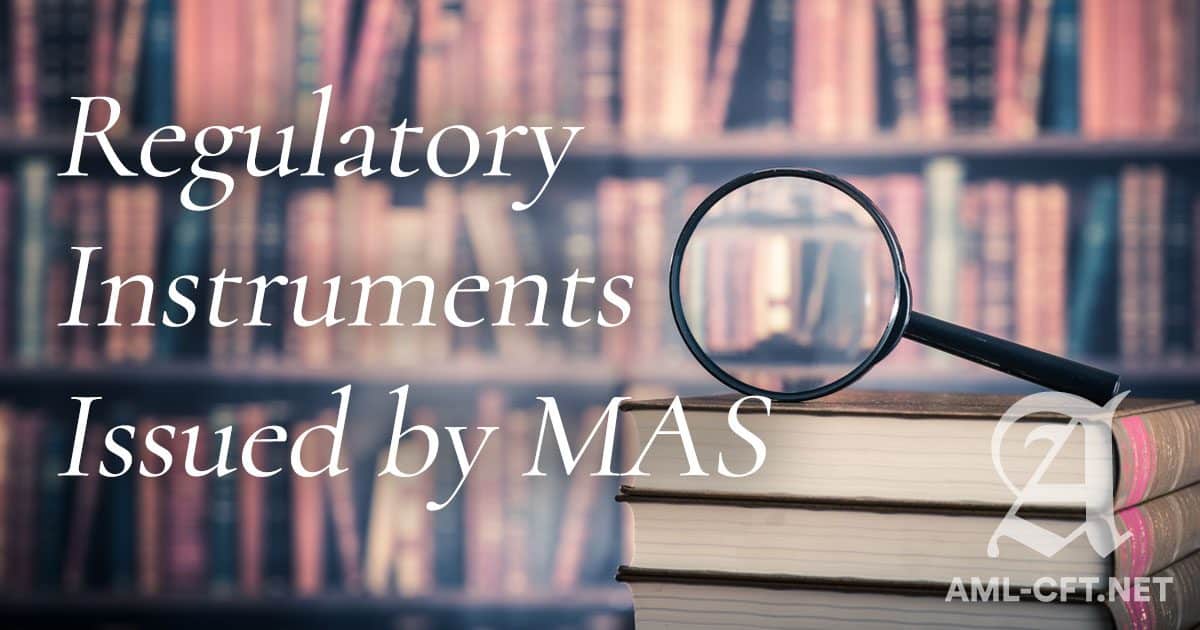
Explore the Library
The Monetary Authority of Singapore (MAS), in carrying out its functions as a regulator of the financial services industry, issues various instruments under Acts administered by MAS. For the purposes of this website, the following classification of instruments issued by MAS is adopted:
(1) Acts
The Acts contain statutory laws under the purview of MAS which are passed by Parliament. These have the force of law and are published in the Government Gazette. Examples are the Banking Act and Financial Advisers Act.
(2) Subsidiary Legislation
Subsidiary legislation is issued under the authority of the relevant Acts and typically fleshes out the provisions of an Act and spells out in greater detail the requirements that financial institutions or other specified persons (e.g. a financial adviser’s representative) have to adhere to. Subsidiary legislation has the force of law and may specify that a contravention is a criminal offence. They are also published in the Government Gazette. Examples are the Insurance (Actuaries) Regulations and Finance Companies (Advertisements) Regulations.
(3) Directions
Directions detail specific instructions to financial institutions or other specified persons to ensure compliance. They have legal effect, meaning that MAS could specify whether a contravention of a direction is a criminal offence.
Directions consist of the following:
(a) Directives – Directives primarily impose legally binding requirements on an individual financial institution or a specified person.*
(b) Notices – Notices primarily impose legally binding requirements on a specified class of financial institutions or persons. Examples are the Notice to Banks (MAS 603) on Branches and Automated Teller Machines and Notice to Life Insurers (MAS 307) on Investment-linked Life Insurance Policies.
* An exception relates to a certain class of instruments, Directives to Merchant Banks, which are essentially “Notices” for the purposes of this classification but, for historical reasons, are known as directives.
(4) Guidelines
Guidelines set out principles or “best practice standards” that govern the conduct of specified institutions or persons. While contravention of guidelines is not a criminal offence and does not attract civil penalties, specified institutions or persons are encouraged to observe the spirit of these guidelines. The degree of observance with guidelines by an institution or person may have an impact on MAS’ overall risk assessment of that institution or person. Examples are the Technology Risk Management Guidelines for Financial Institutions and Guidelines on Standards of Conduct for Insurance Brokers.
(5) Codes
Codes set out a system of rules governing the conduct of certain specified activities. Codes are non-statutory and do not have the force of law. However, a breach of a Code may attract certain non-statutory sanctions like private reprimand or public censure. There is currently a Code on Take-overs and Mergers (which is administered by the Securities Industry Council), a Code on Collective Investment Schemes and a Code of Conduct for Credit Rating Agencies. A failure to abide by a code does not in itself amount to a criminal offence but may have certain consequences.**
**For the Singapore Code on Take-overs and Mergers, please refer to Part VIII and section 321 of the Securities and Futures Act for its effect. For the Code on Collective Investment Schemes, please refer to Part XIII, Division 2 and section 321 of the Securities and Futures Act for its effect. For the Code of Conduct for Credit Rating Agencies, please refer to section 321 of the Securities and Futures Act for its effect.
(6) Practice Notes
Practice Notes are meant to guide specified institutions or persons on administrative procedures relating to, among others, licensing, reporting and compliance matters. Contravention of a practice note is not a criminal offence, unless a procedure stated in the practice note is also required by an Act or regulation. An example is the Practice Note on Lodgment of Documents relating to Offers of Shares and Debentures.
(7) Circulars
Circulars are documents which are sent to specified persons for their information or are published on the MAS website for public information. Circulars have no legal effect. An example is the MAS Circular to Banks on Outsourcing of Cash And Cheque-Related Transactional Services to Another Bank.
(8) Policy Statements
Policy statements outline broadly the major policies of MAS.

Leave a Reply